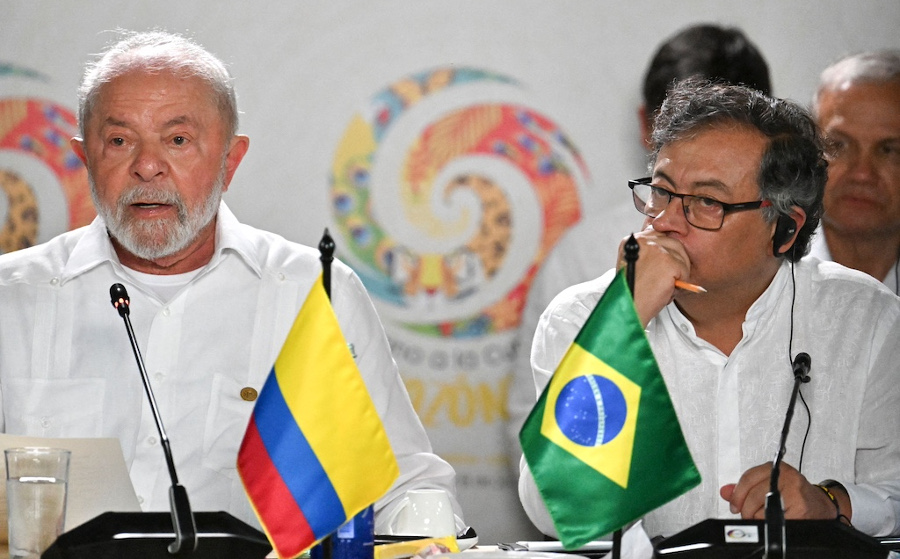|
Trump’s Provocations Are Bolstering Latin America’s Left Lula vs. Trump Different scenarios are playing out in different nations but with similar results: the strengthening of the Left and, in some instances, the weakening of the Right. One type of case is seen in both Brazil and Mexico, where Lula and Mexican president Claudia Sheinbaum have combined firmness with discretion, in contrast to Petro’s more confrontational rhetoric. In July, Lula responded defiantly to Trump’s attempt to strong-arm Brazil through punitive tariffs designed to secure the release of the US president’s ally, former Brazilian president Jair Bolsonaro, who was jailed for his involvement in coup and assassination plots. Unlike other heads of state, Lula refused to reach out to Trump, saying, “I’m not going to humiliate myself.” Instead, Lula declared that “Brazil would not be tutored by anyone,” at the same time recalling the 1964 Brazilian coup as a previous instance of US intervention. The face-off sparked mass pro-government demonstrations throughout the country that far outnumbered those called by the Right demanding the freeing of Bolsonaro. Lula’s supporters blamed the Right for the tariffs, and particularly Bolsonaro’s son Eduardo, who campaigned for them after moving to Washington, DC. Lula called Bolsonaro a “traitor” and said he should face another trial for being responsible for what has come to be called “Bolsonaro’s tax.” In a sign that Trump’s tariffs were a game-changing boost for the Left, the eighty-year-old Lula announced last month that he would run for reelection in October 2026, as his popularity reached the 50 percent mark. Some analysts faulted Lula for having failed to use his thirty-minute videoconference with Trump on October 6 to condemn Washington’s gunboat diplomacy in the Caribbean. According to this interpretation of the call, Lula displayed naivete and gutlessness by combining “concern and accommodation with US imperialism” and believing that “negotiations will be guided by a ‘win-win logic.’” In fact, Lula has spoken out against the US military presence as a “factor of tension” in the Caribbean, which he calls a “zone of peace.” Lula, though, undoubtedly could have gone further, as was urged by the Landless Workers’ Movement (MST) — which backed Lula’s last presidential bid — by explicitly declaring solidarity with Venezuela against US attacks. Still, Lula can hardly be accused of submissiveness in his dealings with Trump. Indeed, Lula and Sheinbaum as well have been adept in their relations with the US president and have ended up getting much of what they wanted. Moreover, at the same time that Trump retreated from his tariff threats against both Brazil and Mexico, he took to praising their respective heads of state. A United Front in the Making In Brazil and elsewhere in the region, a new alignment is emerging, drawing in both right- and left-leaning forces in reaction to Washington’s posture. One notable example was Lula’s appointment of Homeless Workers’ Movement (MTST) activist and former presidential candidate Guilherme Boulos as minister of the presidency in October. Boulos belongs to the Socialism and Liberty Party (PSOL), a leftist split-off from Lula’s Workers’ Party (PT) that endorsed Lula’s 2022 presidential candidacy but had ruled out holding positions in his government. Boulos, who was instrumental in organizing the recent protests against Washington’s tariff hikes, spoke of the significance of his designation: “Lula gave me the mission to help put the government on the street . . . and [listen] to popular demands.” His appointment signals a leftward turn in which, in the words of the Miami-based CE Noticias Financiera, “Lula showed that he is going into the 2026 election ready for war. A war in his own style, using the social movements.” Venezuela is another example where political actors across much of the political spectrum are converging on the need for a broad front to oppose US aggression in the region. No other Pink Tide https://jacobin.com/2025/11/trump-latin-america-left-opposition Back |
|
||||||
|
|||||||




